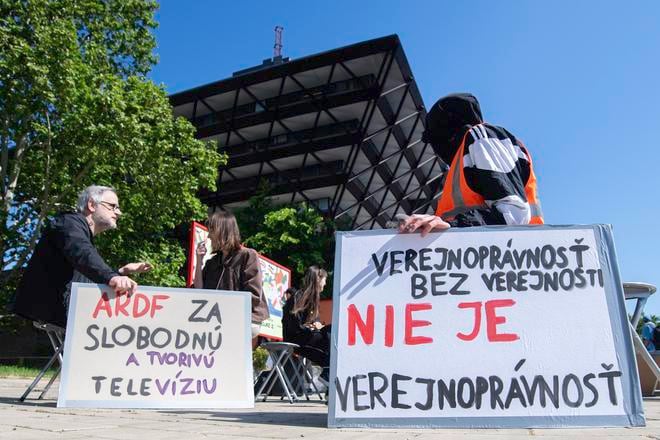Shortly before the election of a new director general of STVR – Slovak Television and Radio – on May 12, a small group of mostly university arts students gathered outside the Slovak Public Radio building to stage a silent protest. They placed empty chairs and banners on the ground, bearing messages such as “About us without us” and “Excluding the public”.
They were not alone. The opposition party Slovensko held a press conference at the same location, denouncing the vote as a “farce” after initially being denied entry and later barred from questioning candidates.
Inside, a 7–2 majority of the STVR Council, a body under government control, selected Martina Flašíková as director general in a closed-door vote. A television producer with little public profile until recently, Flašíková is the daughter of Fedor Flašík, a political strategist who led an election campaign for the ruling Smer party in the past. She defeated four other candidates, including interim director Igor Slanina, and will serve a six-year term.
The election process was conducted in near-total secrecy. Journalists and members of the public were excluded, despite constitutional guarantees of public access to such hearings. A livestream was the only means of observation. Candidates’ CVs and project proposals were not released in advance. While the law permits media presence at council meetings, the council has grown increasingly resistant to transparency.
Legal experts say this marks a troubling departure from democratic norms and likely violates Slovakia’s laws on public oversight. The Film and Television Faculty at the Academy of Performing Arts called the process “alarmingly untransparent”.
“What happened on May 12 marked the culmination of a year-long effort by the governing parties, particularly the SNS [Slovak National Party], which oversees the Culture Ministry, to take control of this public institution,” said opposition MP Jozef Hajko of the Christian Democratic Movement.
The council’s deliberations were especially opaque. Members declined to debate candidates’ projects. “I believe everyone should form their own opinion,” said council chair Ján Krošlák, a former spokesperson for semi-authoritarian Prime Minister Vladimír Mečiar, who ruled Slovakia in the 1990s.


